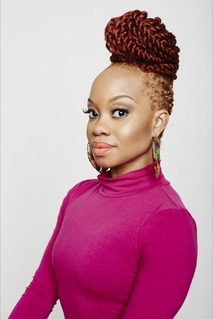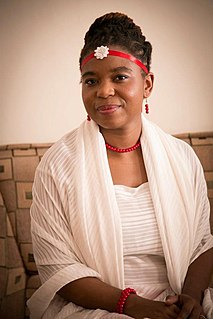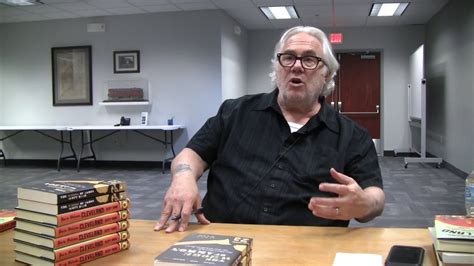A Quote by Toni Morrison
I really think the range of emotions and perceptions I have had access to as a black person and as a female person are greater than those of people who are neither.... So it seems to me that my world did not shrink because I was a black female writer. It just got bigger.
Related Quotes
If you do a black character or a female character or an Asian character, then they aren't just that character. They represent that race or that sex, and they can't be interesting because everything they do has to represent an entire block of people. You know, Superman isn't all white people and neither is Lex Luthor. We knew we had to present a range of characters within each ethnic group, which means that we couldn't do just one book. We had to do a series of books and we had to present a view of the world that's wider than the world we've seen before.
White people scare the crap out of me. I have never been attacked by a black person, never been evicted by a black person, never had my security deposit ripped off by a black landlord, never had a black landlord, never been pulled over by a black cop, never been sold a lemon by a black car salesman, never seen a black car salesman, never had a black person deny me a bank loan, never had a black person bury my movie, and I've never heard a black person say, 'We're going to eliminate ten thousand jobs here - have a nice day!'
The leading distinction in magnets is the sex, male and female, and the next great difference in them is the colour. Those of Magnesia, bordering on Macedonia, are of a reddish black; those of Breotia are more red than black; and the kind that is found in Troas is black, of the female sex, and consequently destitute of attractive power.
I think it's important for people to understand that dance, movement, choreography is about an experience and entertainment but it's also about perception and a lens. So when we're talking about a Black female's experience through a Black female's lens, that's going to be totally different from a Black female's perspective through a Black male's lens.
When someone asks me about violence, I just find it incredible, because what it means is that the person who’s asking that question has absolutely no idea what black people have gone through, what black people have experienced in this country, since the time the first black person was kidnapped from the shores of Africa.
In ancient times, people weren't just male or female, but one of three types: male/male, male/female, female/female. In other words, each person was made out of the components of two people. Everyone was happy with this arrangement and never really gave it much a thought. But then God took a knife and cut everybody in half, right down the middle. So after that the world was divided just into male and female, the upshot being that people spend their time running around trying to locate their missing other half.
I've had frank conversations with theaters who say, 'We love your play, but we've already done a play by another black person this year,' or 'I don't think the kind of people you write about are the ones our audience wants to see'... Up and coming young black female writers are still struggling to have their voices heard and have their plays produced.
I remember when I had my show [The Chris Rock Show on HBO], I used to run my show. It was so hard to get people to bring sketches to me. No one had ever worked for a black person before. Even the black people hadn't worked for a black person. It literally took a month or two for everybody to know: I'm really running the show.
I am more than a black guy. I am a person, I'm storyteller, I'm a son, I'm a friend, so I am all those things, so it is frustrating, to a degree, to be limited by other people's perceptions of me, but at the same time, it is true that I am a black guy, and, you know, it's like I'm rooted in but not bound by.
People often ask me if I feel discriminated against as a black female director. I don't. I'm actually offered a ton of stuff. But I only want to direct what I write. And I prefer to focus on black female characters. What's most important to me is to put characters up onscreen who are not perfect, but who are human and flawed.
As a black person on the outside, because there's so much black art and so much of black people's work circulating, so many people imitating what black people do, you would think that there'd be more black people on the business side. It didn't cross my mind that every label head, for the most part, is a white guy.
I am more than a black guy. I am a person, I'm storyteller, I'm a son, I'm a friend, so I am all those things so it is frustrating to a degree to be limited by other people's perceptions of me but at the same time, it is true that I am a black guy and it's like I'm rooted in, but not bound by. That sort of mentality, that's the one that I hold to be true.
Certainly I feel like I'm the tip of the arrow at times because certainly the national media wants to talk about the fact that I'm a black Republican and some people think of that as zany that a black person would be a conservative but to me what is zany is any person black, white, red, brown or yellow not being a conservative.





































